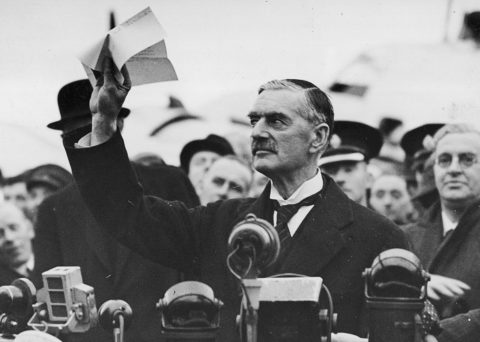Tom at The Last Ditch reacts to his European friends’ facile association of Trump’s overtures to Putin with Chamberlain’s ill-fated attempts to appease Hitler:

Prime Minister Neville Chamberlain at Heston Aerodrome, waving a copy of the Anglo-German Declaration he had negotiated with Adolf Hitler, 30 September, 1938.
Narodowe Archiwum Cyfrowe via Wikimedia Commons.
It’s interesting to watch my Continental friends react on their socials to President Trump’s overtures to that monster Putin — the greatest modern example of a real life Bond villain. Their sympathies, like mine, are with plucky Ukraine. Its soldiers, outgunned and outmanned, have fought like lions and their place in history is assured. Toasts will be drunk and songs will be sung, for sure. But they’re losing and not one European power is ready to send in troops. Under Biden the policy of the West was to fight to the last Ukrainian. Trump sees it in more practical terms.
[…]
Trump’s drama, trolling and exaggeration is in the same category. Most people just don’t get it and react to his bluster like that naive articled clerk I once was. Everything he says and does is calculated to find a path to the best achievable outcome. There’s not a virtue-signalling molecule in his body and yet there’s more actual virtue than in his hypocritical critics.
My European friends are comparing Trump to Chamberlain and Putin to Hitler. Europe seems unable to move on from World War II. Every issue is analysed through the historical lens of how they mishandled the rise of the Nazis. As someone once said, all we really learn from history is that we never learn from history.
The hypocrisy here is breathtaking. If his critics were any more ready than him to send in their troops, they’d have the moral high ground over him. They aren’t and (Poland perhaps excepted) they never will be. So whether it’s just or not, Ukraine can’t win. The only people the Germans and French are ready to see die in this war are Ukrainians, Americans and their loyal English-speaking sidekicks — as usual. So they have no moral basis for their maiden auntery
The post-war settlement has expired. Continental Europeans have to meet their long-neglected NATO obligations and stop expecting Uncle Sam (already carrying more debt than the world has assets) to pay for everything.
Putin is evil, yes, but Ukraine is every bit as corrupt as Russia and would add nothing to NATO’s strength. It’s in the right here as a matter of international law and (for what it’s worth in war) morality. But international law is a myth unless the rich nations enforce it by (plausible threat of) military action. Europe is just standing by signalling virtue while breaching sanctions and sending half the military matériels it promises. Meanwhile Ukraine loses men and wealth with no hope of victory. When the last Ukrainian soldier has died or surrendered, what do Europeans think the outcome will be? Ukrainian flags on your socials won’t win it mes amis.
My advice to my Continental chums? They should let the President try to make peace and hold their comments until they see the result. Based on all my years working in Continental Europe, I expect them all to decry the result and pretend their leaders (prepared to sacrifice nothing) would have done better. It’s bullshit. War is hell and has to end eventually. This is not a Hollywood movie. There are no guarantees that the (relatively) good guys will win. If you won’t end it with arms, then jaw jaw is all you have. This man is much better at jaw jaw than you are so shut up and stop assisting the enemy by showing him how divided the West is.




